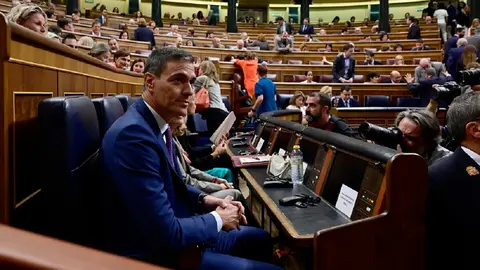Business leaders consider the amnesty to be extremely serious

"It is not possible to raise an issue as serious as the amnesty, which would call into question our rule of law and the independence of the judicial system, simply because of a particular interest, because this amnesty is alien to the general interest, although the Government in office insists on finding euphemisms to describe it". This is how the president of the Círculo de Empresarios, Manuel Pérez-Sala, approached the presentation of the annual survey among its associated entities, whose conclusions are radically opposed to the "euphoria displayed by the Government".
Repeatedly describing the possible granting of an amnesty as "extremely serious", Pérez-Sala stressed that "granting it as part of a negotiation for the investiture of a government is buying votes in exchange for impunity, and is unprecedented in any democratic country in our environment".
He denied that such a possible concession to the Catalan coup plotters would bring about any kind of national reconciliation, since "its possible beneficiaries do not want this alleged reconciliation because they do not recognise the crime and show no repentance, but in any case making use of this extreme resource should necessarily have the practically unanimous support of Parliament... To obtain it with the essential votes of the very criminals who will be favoured by it, in exchange for their favour, for the benefit of the parties that promote it, is something that goes against the foundations of the rule of law".
Such a categorical statement overshadowed the survey's findings, which include the worsening of the main obstacles to competitiveness. He quoted Winston Churchill, for whom there were only three ways of looking at the entrepreneur: as a tiger to be shot; as a cow to be milked; or as an individual who puts his talent and money at risk to create wealth. According to the president of the Círculo, the government of Pedro Sánchez sees us as tigers to be beaten, "as evidenced by the naming of entrepreneurs such as Amancio Ortega, Juan Roig and Rafael del Pino, who have done nothing but create wealth and jobs".
Other obstacles which, in their opinion, prevent the normal development of business activity and which have worsened since last year are: interventionism, poor institutional quality, lack of transparency in government decisions, growing legal uncertainty and poorer regulatory quality.
The companies that have spoken out in the survey have a general negative assessment of the impact on the competitiveness of the Spanish economy of the imbalance in the public accounts, the increase in interest rates, the failure to deflate tax rates and the failure to link wages to productivity. He accused the political parties of ignoring the thorny issue of pensions when there are elections in order not to face reality. And this, according to the Círculo de Empresarios, is as simple as the fact that, in order to avoid their bankruptcy, there are only two solutions: lowering their amount or increasing the retirement age, and in their case they are in favour of the latter, promoting incentives for workers to prolong their working lives.
The report's section on the European Union's Next Generation funds is also devastating. Less than half of the companies have applied for these funds. Those that have not done so cite the complexity of the administrative procedures required. Among those who have applied, only 18.5% report having had a favourable experience, compared with more than 50% who rate it negatively.










